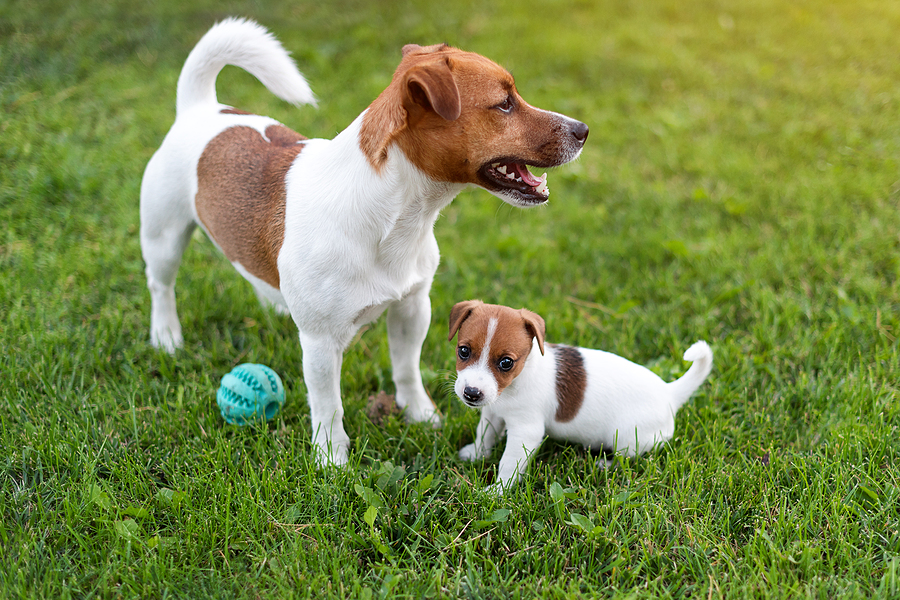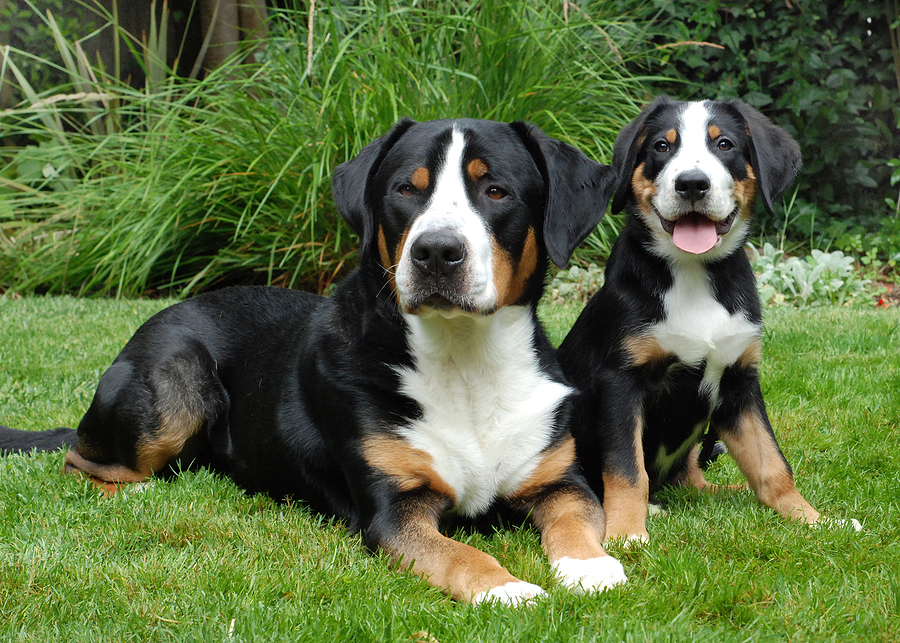Training a puppy can be an exciting yet challenging task. While professional guidance and structured training are essential, there’s another valuable resource that often gets overlooked: older dogs. If you are bringing a new puppy into a home with an adult dog, you may wonder: Do puppies learn from older dogs? The short answer is “Yes”. Puppies have an incredible capacity for learning through social observation, and older dogs can serve as excellent role models. Let’s dig into the benefits of this learning method, and how to facilitate positive learning experiences.
Understanding Social Learning in Dogs
Social learning involves learning behaviors through observation and imitation. In the animal kingdom, many species, including dogs, learn by watching and mimicking the actions of others. This method of learning is crucial for developing social behaviors and adapting to new environments. For puppies, social learning can significantly enhance their understanding of acceptable behaviors and improve their overall development.
Benefits of Learning from Older Dogs
Behavioral Modeling
Older dogs often exhibit well-established behaviors that puppies can observe and emulate. This behavioral modeling is especially useful in teaching basic commands, house training, and appropriate social interactions. Puppies are naturally inclined to mimic the actions of older, more experienced dogs, making the training process smoother and more effective.
Accelerated Learning
When puppies observe older dogs, it can speed up their training. This accelerated learning process reduces the time and effort required for training, as puppies quickly pick up on behaviors and routines demonstrated by older dogs. Owners can take advantage of this by creating opportunities for puppies to observe and interact with trained adult dogs.
Emotional and Social Development
Interaction with older dogs can boost a puppy’s confidence and reduce anxiety. Puppies learn to navigate social hierarchies, understand body language, and develop better social skills. These experiences are crucial for their emotional and social development, helping them become well-adjusted adult dogs.

Behaviors Puppies Learn from Older Dogs
Basic Commands and Obedience
Puppies can learn fundamental commands such as “sit,” “stay,” and “come” by watching older dogs respond to these commands. The older dogs’ consistent responses and rewards reinforce these behaviors in the puppy’s mind.
Social Etiquette
Older dogs teach puppies about appropriate play behavior, bite inhibition, and reading canine body language. Through play and interaction, puppies learn the dos and don’ts of dog etiquette, which is vital for their socialization.
House Training
House training becomes more manageable when puppies observe older dogs’ bathroom routines. Puppies learn where and when to relieve themselves by following the example set by their senior counterparts.
Pack Dynamics
Puppies also learn about pack dynamics and their place within a group by interacting with older dogs. This understanding helps them integrate smoothly into multi-dog households and enhances their ability to interact with other dogs outside the home.
Facilitating Positive Learning Experiences
Supervised Interactions
While puppies do learn from older dogs, there’s the risk of puppies picking up undesirable habits Interactions should be supervised to ensure safety and positive learning. Owners should watch for signs of stress or aggression and intervene when necessary to guide interactions constructively.
Guided Training
Combining observational learning with direct training can enhance the overall learning experience. Owners should reinforce the behaviors observed by puppies and provide additional guidance to help solidify these lessons.
Reinforcement and Rewards
Positive reinforcement is key to encouraging desired behaviors. By rewarding both the older dog and the puppy for good behavior, owners can strengthen the association between the action and the reward, making the behavior more likely to be repeated.
The Role of Professional Training
Expert Guidance
Professional trainers bring valuable expertise to the table. They can offer customized training plans that cater to the specific needs of puppies and older dogs, ensuring that social learning is maximized effectively.
Structured Socialization Programs
Puppy classes and group training sessions provide structured environments where puppies can learn from older dogs under professional supervision. These programs offer opportunities for puppies to interact with a variety of older dogs, enhancing their social skills and learning experiences.

Puppy Training at Beau’s K9 Academy
Puppies have a remarkable ability to learn from older dogs, benefiting from behavioral modeling, accelerated learning, and enhanced social development. However, factors such as breed, temperament, and early experiences influence how quickly and effectively puppies learn from older dogs. It is important to recognize these individual differences and provide appropriate support and training.
For those seeking structured guidance and expert advice, professional training services can be an invaluable asset. Beau’s K9 Academy specializes in tailored training programs for puppies and adult dogs, ensuring a positive and effective learning experience. Contact us today to learn more about our programs and how we can help your furry friend thrive.
Do Puppies Learn from Older Dogs? – FAQS
Do puppies learn from older dogs?
Yes, puppies learn through social observation and imitation, making older dogs excellent role models for teaching behaviors.
What behaviors can puppies learn from older dogs?
Puppies can learn basic commands, social etiquette, house training routines, and pack dynamics from older dogs.
How does interaction with older dogs benefit a puppy’s development?
Interacting with older dogs boosts a puppy’s confidence, reduces anxiety, and enhances social skills, contributing to better emotional and social development.
Are there any risks to puppies learning from older dogs?
Yes, puppies might pick up undesirable behaviors from older dogs, so supervised interactions are crucial to ensure positive learning experiences.
How can I facilitate positive learning experiences between my puppy and an older dog?
Supervise interactions, combine observational learning with direct training, and use positive reinforcement to encourage desired behaviors.

